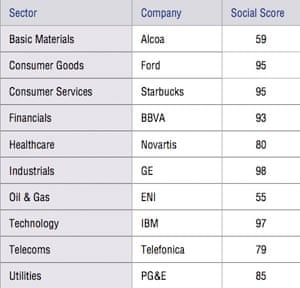Social media has forever changed the way companies communicate. The world of marketing, PR and advertising get it, yet when it comes to communicating corporate social responsibility (CSR) and sustainability policies the majority of companies ignore social media altogether.
Custom Communication studied 287 of the world's most sustainable companies – the North American and European members of the Dow Jones Sustainability Index (DJSI) – and analysed how they were using blogs, Facebook, Twitter and YouTube, as well as niche sustainability social communities. Nearly 60% are failing to use social-media channels to involve the public about their sustainability actions and thinking. That figure is all the more striking when you consider 84% of these companies have already embraced social media for general PR or marketing purposes.
The report's Social Media Sustainability index identifies and ranks 120 companies that are using social media in sustainability communications. The names of the best-performing companies won't surprise you. They are acknowledged social-media innovators like Pepsi, Dell, Starbucks, IBM and Ford. At the head of the index is General Electric, whose Ecomagination challenge is raising the bar for how companies can demonstrate their commitment to society in an engaging and social manner. As with the DJSI the report offers an analysis of how competitors are performing against each other in 10 broad industry sectors. Below are the sector leaders.

The philosophies of social media and sustainability have a great deal in common. Both are built on the pillars of transparency, ethics and innovation, and both can help secure a company's bottom line. The most successful social-media sustainability communicators are all demonstrating how their companies can be useful to the greater community and they're doing it in a way that allows true community participation and feedback. The Pepsi Refresh Project, Ford's the People's Fleet and IBM's Smarter Planet are the poster children for this smart social-media strategy.
Yet, with so many common goals and so many possibilities to combine and create stronger, more ethical businesses, why are the majority of the DJSI-lauded companies doing so little to communicate their work using social media? Part of the answer, we suspect, is the traditional niche role that sustainability plays within organisations. All large companies consider sustainability or CSR communications a necessary function but they tend to direct their communication resources towards very targeted stakeholders, be it shareholders, sustainability watchdogs and NGOs, plus the 'green' business press.
The way companies have chosen to inform these stakeholders is by publishing a corporate report dedicated to CSR/sustainability. Ten years ago that was an innovative concept. But while companies were focusing their energy (and an enormous amount of money) on producing CSR reports, the role of sustainability communications took on greater responsibility as: a, climate change, green issues and social causes became more important to the general public; and b, the public started embracing social media to share conversations and give feedback on companies. We found it particularly telling that for all the money, time and effort that goes into producing CSR and sustainability reports, just a handful made the effort to make those reports accessible and discoverable through social media.
The full report can be found on the Social Media Influence website.
As part of our research we also decided to compile A Short History of Social Media CSR – The Good the Bad and the Ugly. Let us know if we missed any good examples!
Matthew Yeomans is director of Custom Communication, a social media content and strategy consultancy, specialising in sustainability news and communication.
This content is brought to you by Guardian Professional. Become a GSB member to get more stories like this direct to your inbox

Comments (…)
Sign in or create your Guardian account to join the discussion